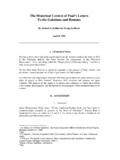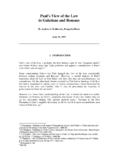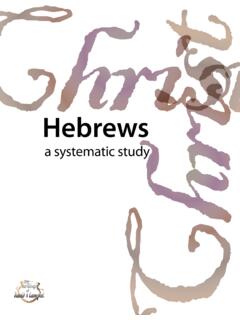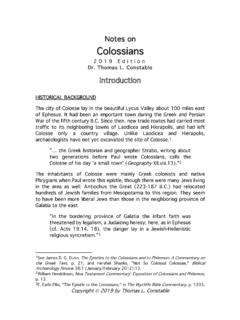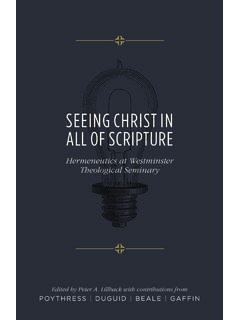Transcription of God’s “omni” Attributes - KulikovskyOnline
1 God's omni Attributes By Andrew S. Kulikovsky (Hons). November 12, 2000. I. INTRODUCTION. Probably the most well known of God's incommunicable Attributes are what have become known as the omni Attributes omnipotence, omniscience, and omnipresence. However, none of these words are actually mentioned in the scriptures, but are in fact Latin derivatives used to identify the theological constructs pertaining to God's power, knowledge and presence. It is because of this that these Attributes of God have been misunderstood by many people . both Christians and non-Christians. People's understanding of God's power, knowledge and presence seems to be limited to their understanding of the words omnipotence , omniscience, and omnipresence respectively.
2 Thus, the purpose of this paper is to expound the proper meaning of these words in relation to the Attributes of God and the teaching of scripture. II. OMNIPRESENCE. 1. Definition The term omnipresence is borrowed from Latin. It is a compound of omni , meaning all, . and praesens, meaning here. Thus, God is always here, close to everything, next to This means that God is unlimited with respect to space. As Wayne Grudem puts it, God does not have size or spatial dimensions and is present at every point of space with his whole being, yet God acts differently in different places."2. A. W. Tozer posits that fewer truths are so clearly taught in Indeed, the scriptures teach that even though the highest heavens cannot contain God (1 Kings 8:27), He is still nearby when we pray, unlike other Gods, which don't even exist (Deuteronomy 4:7).
3 Yet, God is not just nearby, He is in fact everywhere! He fills heaven and earth and no-one can hide from Him. There are no secret places where He is excluded (Jeremiah 23:23-24). The Psalmist summarises this truth beautifully: Where can I go from your Spirit? Where can I flee from your presence? If I go up to the heavens, you are there; if I make my bed in the depths, you are there. If I rise on the wings of the dawn, if I settle on 1. A. W. Tozer, The Knowledge of the Holy (Carlisle: OM Publishing, 1987) 100. 2. W. A. Grudem, Systematic Theology (Grand Rapids, MIchigan: Zondervan, 1994) 173. 3. Tozer, 100. God's omni Attributes Page 2 of 8. the far side of the sea, even there your hand will guide me, your right hand will hold me fast (Psalm 139:7-10, NIV).
4 2. Objections It appears that Colossians 2:9 presents a real problem for this doctrine: For in Christ all the fullness of the Deity lives in bodily form. Yet Christ is apparently not omnipresent. Indeed, verses such as Matthew 26:64 and Mark 16:19, which describe Christ as sitting at the right hand of God, present a similar problem. On the other hand, John 3:13 contains a variant reading which adds the phrase o9 w@n e0n tw~|. ou)ranw~| ( who is in heaven ) to the end of the verse. The majority of the United Bible Societies committee rejected this variant's authenticity, labeling it as an interpretive gloss, reflecting later Christological development ,4 but David Alan Black has pointed out that there is overwhelming evidence (both internal and external) suggesting that the variant is, in fact, If this is the case, John 3:13 teaches that the Son of Man was in heaven when Jesus uttered the words of that verse.
5 Yet Jesus Himself is identified as the Son of Man . throughout the gospels. This implies that the Son of Man was not only in heaven but was also living among humans on Earth. Thus, according to John 3:13, it is possible for the Son of Man to be in multiple places at the same time. But how can this be? How can a physical body in time and space be omnipresent? Henry Thiessen resolves the problem by stating that omnipresence is not a necessary part of God's being, but rather, is a free act of His will: If God should will to destroy the universe, his omnipresence would cease, but he himself would not cease to be. 6 John Walvoord adds: To explain a body as omnipresent, however, ends in a concept of a body which has lost all of its distinguishing this reason, it is preferable to regard the qualities of the human nature of Christ as finite.
6 The body, soul, and spirit have locality, but do not have the infinite qualities that belong to the divine In other words, the second person of the Trinity (God, the Son), who was incarnated as Christ Jesus, is omnipresent even while Christ was living on Earth. The Word, who was with God in the beginning, and who was God in every aspect, became flesh and dwelt among men (John 1:1-2, 14). Therefore, the incarnation does not necessarily lead to a falsification of omnipresence. 3. Llife Application The doctrine of omnipresence is extremely comforting and subduing to the believer since God is always available to help (Psalm 46:1). He is near to all those who call on him (Psalm 145:18), and always will be to the very end of the age (Matthew 28:20b).
7 On the other hand, 4 nd See B. M. Metzger, A Textual Commentary on the Greek New Testament 2 edition (UBS, 1994). 5. D. A. Black, The Text of John 3:13 Grace Theological Journal 6 (Sep 1985) 49-65. 6. H. C. Thiessen, Lectures in Systematic Theology, rev. ed. (Grand Rapids, Michigan: Eerdmans, 1979) 80. 7. J. F. Walvoord, The Present Work of Christ Part VIII: The Present Work of Christ on Earth . Bibliotheca Sacra 122 (Oct 1965) 292. God's omni Attributes Page 3 of 8. the doctrine is also a strong warning and a deterrent, since no-one can escape the presence of God. III. OMNISCIENCE. 1. Definition Again, the term omniscience is borrowed from Latin. It is also a compound of omni , meaning all, and scienta, meaning knowledge. Grudem explains it in this way: God fully knows himself and all things actual and possible in one simple and external act.
8 8 Or, as Tozer describes it, God knows every possible item of knowledge concerning everything that exists or could have existed anywhere in the universe at any time in the past or that may exist in the centuries or ages yet unborn. 9 In other words, God is infinite in regard to knowledge. He knows Himself and all other things perfectly (Job 37:16), whether they be actual or merely possible, throughout all of time (Isaiah 46:10; 1 John 3:20b). He knows things immediately, simultaneously, exhaustively and Since God knows all things perfectly, He knows nothing better than any other Tozer adds that God knows instantly and effectively all matter and all matters, all mind and every mind, all spirit and all spirits, all being and every being, all creaturehood and all creatures, every plurality and all pluralities, all law and every law, all relations, all causes, all thoughts, all mysteries, all enigmas, all feeling, all desires, every unuttered secret, all thrones and dominions, all personalities, all things visible and invisible in heaven and in earth, motion, space, time, life, death, good, evil, heaven and In addition, if God has perfect knowledge.
9 He has no need to learn. Moreover, such perfect knowledge implies that God has never learned and, in fact, cannot Thus, God does not need to reason toward His conclusions or ponder carefully over His Indeed, Isaiah writes: Who has understood the mind of the LORD, or instructed him as his counselor? Whom did the LORD. consult to enlighten him, and who taught him the right way? Who was it that taught him knowledge or showed him the path of understanding? (Isaiah 40:13-14, NIV). Furthermore, the scriptures teach that God's understanding is infinite (Psalm 147:5), and that all persons of the Trinity know each other perfectly (Matthew 11:27; 1 Corinthians 2:10-11). Nothing is hidden from God's sight everything is uncovered and laid bare before Him (Hebrews 4:13).
10 The Lord watches all of Mankind and considers everything they do (Psalm 33:13-15). His eyes are everywhere, keeping watch on the wicked and the good (Proverbs 15:3). Each person's attitudes, behaviour and choices are in full view of God (Proverbs 5:21). No thought, action, desire or motive can be hidden from Him as the Psalmist explains: O LORD, you have searched me and you know me. You know when I sit and when I rise; you perceive my thoughts from afar. You discern my going out and my lying down; you are familiar with all my ways. Before a word is on my tongue you know it completely, O LORD. (Psalm 139:1-4, NIV). 8. Grudem, 190. 9. Tozer, 77-78. 10. Thiessen, 81. 11. Tozer, 78. 12. Ibid. 13. Ibid. 76. 14. Grudem, 191. God's omni Attributes Page 4 of 8.
